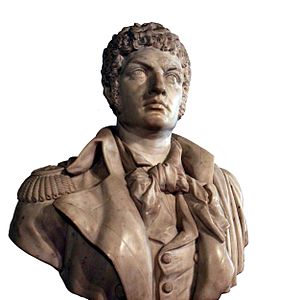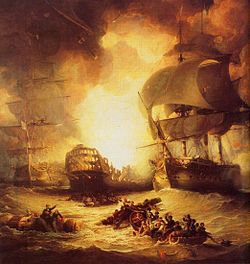Luc-Julien-Joseph Casabianca
Luc-Julien-Joseph Casabianca | |
|---|---|
 Bust of Luc-Julien-Joseph Casabianca | |
| Born | 7 February 1762 Vescovato, Haute-Corse, Corsican Republic |
| Died | 1 August 1798 (age 36) Aboard Orient, Aboukir Bay |
| Allegiance | |
| Service/ | |
| Rank | Capitaine de vaisseau |
| Commands held | Orient |
| Battles/wars | French Revolutionary Wars |
| Other work | Deputy for Corsica at the National Convention |
Luc-Julien-Joseph Casabianca (French pronunciation: [lyk.ʒyljɛ̃.ʒozɛf kazabjɑ̃ka]; 7 February 1762 - 1 August 1798) was an officer of the French Navy in the 18th century.
Career

Casabianca distinguished himself in the Royal French Navy, was a deputy for Corsica at the National Convention, then became member of the Council of Five Hundred. He was the commander of flagship Orient, which transported Napoleon across the Mediterranean during his expedition to Egypt.
During the Battle of the Nile of 1 August 1798, where Rear-Admiral Horatio Nelson destroyed the French fleet in Aboukir Bay, Casabianca fought heroically until his death. During the course of battle, he ordered Giocante, his 12-year-old son who accompanied him, to remain in a section of the ship until he called for him. Although the ship was on fire, the boy, who did not know that his father was no longer alive, refused to leave his post without receiving his orders. The fire reached the gunpowder section; the child perished in the explosion as well as a large part of the crew.
Posterity
Literature
Felicia Hemans made the death of Giocante Casabianca the subject of her poem "Casabianca", with its line "The boy stood on the burning deck ...", which became a classic of English literature and was studied in elementary school classes.
At least six ships of the French Navy have borne the name Casabianca.[1]
See also
References
- "Luc-Julien-Joseph Casabianca", in Adolphe Robert and Gaston Cougny, Dictionnaire des parlementaires français (1789-1891), Bourloton, Paris, 1889 Edition details Wikisource
- This article incorporates text from a publication now in the public domain: Wood, James, ed. (1907). The Nuttall Encyclopædia. London and New York: Frederick Warne.
{{cite encyclopedia}}: Missing or empty|title=(help)
